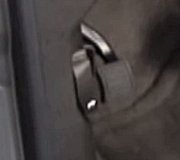Something is causing the alternator to be "full-fielded". Left alone, this will ruin the battery. Do you know where the smoke was coming from? Just to be safe, measure the voltage right across the battery terminals while the engine is running. If it is indeed 18 volts, the system is over-charging. In this case, no fuse link is burned open. If you find 12 volts or less, or the battery goes dead while driving, measure the voltage on the large terminal on the back of the alternator while it's running. If this is the one with the loose bushing you referred to, the wire must be removed, and the nut under it tightened to prevent intermittent operation. Disconnect the battery before removing this wire. If you find 18 volts there, the output current isn't making it back to the battery. Suspect an open fuse link. This would happen if the heavy wire on the alternator was mistakenly grounded. The dash gauge is connected to the alternator side of the fuse link, and since the voltage regulator in the engine computer sees the lower battery voltage, it commands the alternator to work harder and harder in an attempt to get the battery voltage up to 13.75 to 14.75 volts.
Another way to test for an open fuse link is to measure the voltage on the large alternator terminal with the engine NOT running. Full battery voltage must be on that terminal at all times. If it's missing, a fuse link is burned open. I seem to recall it is a wire very near the positive battery terminal, possibly in a large two-wire connector.
If the battery voltage is too high, (over 14.75 volts), one of the small alternator wires is grounded or the voltage regulator is defective. Finding this problem involves measuring the voltages on the two small terminals on the alternator. One will be battery voltage; the other one will less, but it should not be zero. The lower the voltage on the second wire, the bigger electromagnetic field is being produced, and the higher the voltage, (and resultant current), is being requested by the voltage regulator. Chrysler voltage regulators very rarely develop problems, even when something was connected incorrectly.
The two small terminals are usually in a plastic block so they can't be mixed up. Even if they are separate individual wires, as on older cars and trucks, they can be installed either way. Switching those two wires will have no affect on alternator operation.
If you don't find the problem, send a reply with the voltage readings on the three alternator terminals with the engine running and with the ignition switch off.
I don't get compensated for answering questions. I share my expertise because I like older Chrysler products from the days before every imaginable item on the vehicles became computer-controlled, and I want you to like your product too. My daily driver is an unbelievably reliable 1988 Grand Caravan with only the one engine computer. My two newer cars just sit here unused, and I will likely never buy another new car because of all the unnecessary, unreliable, complicated computers.
Caradiodoc
SPONSORED LINKS
Monday, April 27th, 2009 AT 4:44 AM




